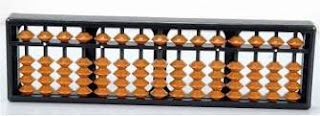October 6 Eureka
Apprentice:
Study/Learn
1. Let's start by {possibly} creating a Eureka moment :
Answer these questions:
Exactly how old are you?
Calendars have been in use for thousand of years.
In our current calendar, how many days are in a year?
Prove it!
Calculate how many days you have been alive.
Calculate how many days you will have been alive on your next birthday.
Let us all know how old you really are on October 6 in class.
2. What do we think about the abacus? Let's give it some time and learn how to move the beads.
Some tips:
*Remember, I know these small problems are EASY to do in your head.
*You are learning to see how the beads work and creating a muscle memory for your fingers.
*If you get really good at these easy problems, later ones will be easier.
If you did not (or even if you did) get a worksheet,
here is one you can download and print. Work for a few minutes each day, and you will learn fast! Either do one row of the worksheet, OR have someone quiz you. Remember, all we are doing right now are numbers that add (or subtract) to less than 10.
http://mmtplonline.com/uservideo/1st%20Level%20Practice%20Sheet.pdf
3. Most of you seem pretty confident with the multiplication we briefly touched in class. But practice is always good! Choose which multiplication tables you need to work on the most out of 0s, 1s, 2s, 5s, and 10s. Go
here to create your own personalized flashcard experience. Spend 5 min/day practicing times tables.
http://www.mathusee.com/e-learning/drills/
4. Read from the Story of Science chapters 4, 8 and 9.
5. Read from Mathematicians are People, Too Volume 1 Chapters 1 and 2 (Thales and Pythagoras)
6. Create cards from the Dictionary of Cultural Literacy for:
Hieroglyphics
Rosetta stone
Pyramids
Know/Understand
1. Be prepared to answer: What's Ionia?
2. Thales and Pythagoras discovered some of today's foundational principles of math. Your reading will teach you a lot about them.
Choose 1 of these interesting men to teach us about in class. BUT, I just want 1 aspect (or part) of that man's life. It could be a story about his life, or a principle he discovered. You can pull from your reading, or other sources. Each of you will have 3-5 minutes to teach or demonstrate. You can work together with a sibling!
Some ideas you could use are:
Dress up as one of them, and tell a story as if you were him.
Share a Eureka moment about understanding a principle.
Teach Thales propositions on pg 39 of your science book.
Teach about the concepts on pg 42-43 of your science book.
Teach about magic numbers on pg 67 of your science book.
Teach about the concepts on pg 70-71 of your science book.
Teach about the pythagorean theorem on page 79 of your science book.
Teach the principles from page 81, 82-83, or 84-85
Or Choose your own idea.
Have fun with it!
Become/Serve
It's exciting to learn new things, and make our brains stretch around new ideas. But (especially in the the field of science) some of those ideas don't always jive with our belief system. And we might wonder...."Why is this even important for me to know?" Good question! What do you think?
1. Read
this article, and be prepared to answer:
Do Science and Religion Conflict?
https://www.lds.org/new-era/2016/07/science-and-our-search-for-truth?lang=eng
2. The ability to think through problems is innate, but if we do not practice, that ability weakens. Be grateful that you can THINK! I invite you to take time in your prayers this week to thank Heavenly Father for your ability to think and solve problems!
Journeyman:
“This afternoon I labored on the Egyptian alphabet, in company with Brothers Oliver Cowdery and W. W. Phelps, and during the research, the principles of astronomy as understood by Father Abraham and the ancients unfolded to our understanding.” ----Joseph Smith
Simply go to
SkyandTelescope.com and find the new This week's Sky at a glance. Go outside after dark at least once this week and see what you can find in the sky based on what you learn.
We are jumping ahead for this month, and will get to the planets starting next month.
2. Read Chapter 13 in your Astronomy Book. There are so many fascinating ways a conversation could go. I want YOU to drive it. Choose a sub section of this chapter to learn more about in depth, and be prepared to present it in class. 3-5 minutes.
Many people have found meaning in the stars throughout the ages. Not only an important navigational tool, the stars have held, and still hold great religious significance. (Including astrology, which we will talk about in class briefly). Pictures in the stars have meaning. Some people even believe the gospel in is the stars. Why not?
3. Anyway, please choose ANY constellation in the earth's sky to learn more about, and share with the class (doest't have to be long)......
......It's picture, meaning, and any important stars within it.
Masters:
1. String, Straight Edge and Shadow is our book this month. Skip the first 47 pages (you're welcome!) The rest of the book will be some review of things we've been doing, and go into more depth. We will play with some of the concepts in class.
2. Read the next 3 Stories in Penrose the Mathematical Cat, pages 26, 28 and 32.
3. Much like last time, teach any concept from your reading. Find one that interests you the most.
Happy Learning!







